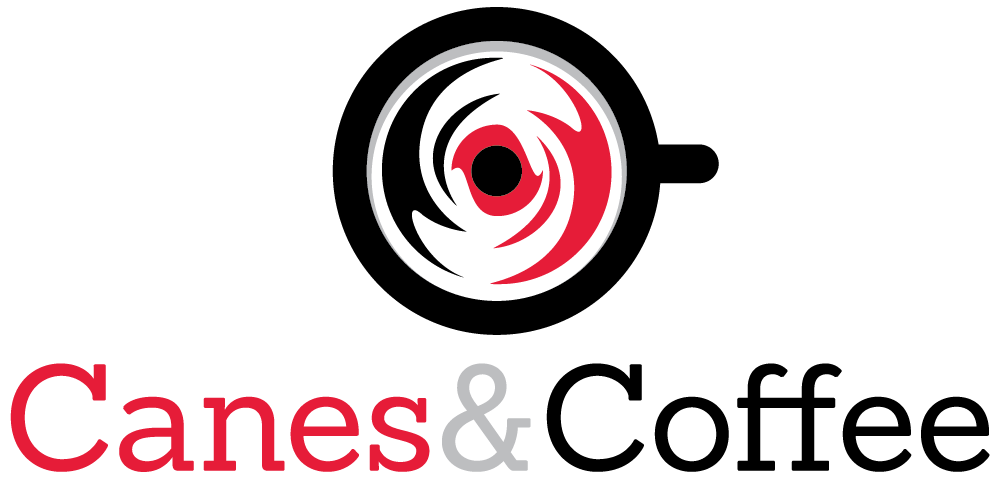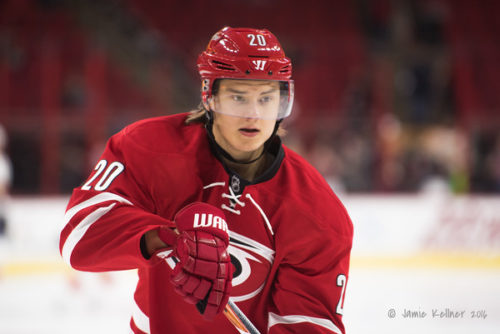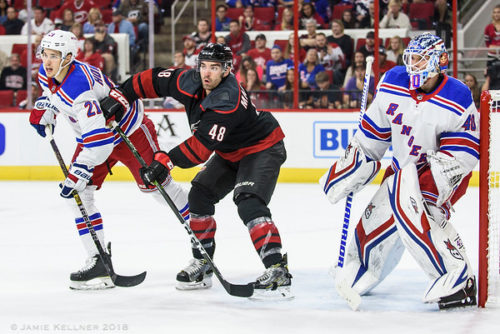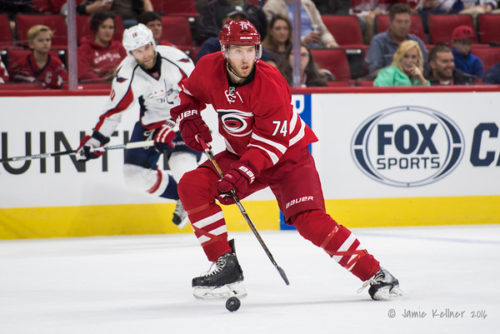Cam Ward’s work load
Per Coach Bill Peters’ interview this afternoon on the team web site, the current plan is to start Cam Ward on Friday night for his 18th consecutive start in net for the Hurricanes. At 32 years old, Ward is tied for third among NHL goalies for games played, but that understates his recent workload. In the first quarter of the season, Ward played 15 of 20 games which is a normal 60-game pace (prorated over 82 games) for a starter. In the second quarter of the season, he played 20 of 21 games which is a seemingly unsustainable pace of 78 out of 82 games.
Cam Ward’s level of play
In total, Cam Ward has been very good so far in 2016-17 which is partly why he is playing so much. His .915 save percentage is slightly below average at 26th out of 47 goalies who qualify and his goals against average at 2.31 which ranks him 13th out of 47 qualifying goalies. More broadly than that, especially in late November through December, Ward has generally given the Hurricanes a chance to win and also had his share of games where he was the difference-maker in a win that perhaps the team did not deserve. If Ward can match his play through 41 games in the second 41 games, I would gladly take it.
But is he tiring?
More recently, Ward has let in a few soft goals and his play seems to be oscillating a bit between great and not very good. For January, Ward’s save percentage is a less stellar .905 with a higher but still respectable 2.42 goals against average. Ward’s numbers were a scintillating .935 and 1.74 when he was lights out in November and still respectable at .917 and 2.28 in December. The trend is obviously not favorable begging the question of if he will bounce back or at least hold at December numbers or if the slide will continue as the heavy work load pushes deeper into the season.
The backup situation – Eddie Lack and Michael Leighton
Hopes that an off-season and chance to reset would boost Eddie Lack’s level of play from a rough 2015-16 season were not realized out of the starting gate. In 4 starts as part of a fairly normal starter/backup rotation to start the season, Lack was 1-2-1 with a 3.79 goals against average and a .856 save percentage. The sample size is small, but the results were not good. For back ups, I am inclined to accept an occasional horrible start because of rust or whatever and prefer use some measure of quality starts to gauge at least reasonable effectiveness. In that regard, Lack had 1 good start (his 4-2 win against Calgary), another okay start in the 4-3 overtime loss to Vancouver that saw the team collapse in front of him in the third period and then 2 bad starts to close things out. I think reasonable would be to hope for some combination of 3 good or at least okay starts out of 4 and be willing to live with 1 bad start. So to net it out, Lack was not great.
Enter Michael Leighton. Leighton started the season absolutely red hot in the AHL posting win after win, collecting shut outs and carrying a goals against average pretty close to 1.00. To this day, I think Hurricanes’ management and coaching missed the boat on Michael Leighton. To be clear, as a journeyman 33-year old, I do not see him as a long-term solution. And I also acknowledge that there is a good chance that even if he played well he would fizzle out at some point. But in the case of backup goalies, except for the few teams that have 2 good goalies usually because 1 is a young up-and-comer, backup goalies are by definition average or even below average relative to NHL starters. It is just the reality of it. And because of that I say that “hot” trumps “good” at least for a period of time. On October 31 when he was still red hot at the AHL level, I wrote a detailed case for giving Leighton at least a look in the backup role. 27 days later on November 27 after he had mostly cooled to room temperature and also had time to accumulate some rust sitting on the bench at the NHL level, Michael Leighton finally stepped into the net. He started slow ended up playing a phenomenal game in a 3-2 win. For about 3 days, it felt like the Hurricanes, at least temporarily, had a serviceable backup goalie. But that ended abruptly when Leighton was not very good in a 3-2 loss on the road to the Rangers on December 3. He, nor anyone else other than Cam Ward, has started a game for the Carolina Hurricanes since then.
The need for trust, guts and recognition of necessity
Managing the work load of a backup goalie is in my opinion 1 of the most challenging things for an NHL coach, and it becomes 3-4 times more challenging in cases where a team does not have a great backup or 1A/1B situation and also in cases of teams that are either on the playoff cut line or below it and need to play to win every game. And that describes the Carolina Hurricanes to a T.
For any single game, if Coach Bill Peters asks himself what the best decision is in net to focus on winning only that 1 game, the answer right now is always Cam Ward. Even if he is maybe a little tired or maybe played the night before or maybe is coming off a lesser game, he is still the best option for that 1 game. But the problem is that making a string of 1-game decisions is not sustainable over a long NHL season. And as you go longer and longer without getting the backup game action, the probability that he is going to be rusty and put forward a sub-par game increases. As the probability of a sub-par game increases, the inclination to just ride the starter for 1 more game increases. It has the potential to turn into a death spiral that sees the starter hit a wall physically and mentally at about the same time that the backup is so far removed from game action that basically it would take the team investing a run of a few games (likely with bad results) to get him back up to speed. As of right now, Eddie Lack who is on injured reserve is more than 2 months removed from NHL game action, and Michael Leighton last started at the NHL level for 40 days. Leighton did see action in relief against Vancouver and also collected a couple of AHL starts in between NHL games which gives him some greater probability of being able to step back into the fray.
At a coaching level, there is some weird balance that must be struck between putting the best lineup for today on the ice but also making sure you do not run that combination into the ground. It takes some combination of trust, guts and maybe even a willingness to risk chucking a game into the loss column to make sure you still have a #1 goalie in late March when things are busy and hopefully the games matter even more. As of right now, the Hurricanes are not striking that balance.
Does a goalie really need rest?
I would absolutely love to have this conversation with Cam Ward or maybe even another former NHL goalie at the end of the season if I could get player access during the summer. My questions are thus…What drives the expectation that something like 60-65 games is a ceiling for a modern NHL goalie? Is it the need for physical rest? Is it the need for mental rest? Is it too much wear and tear from playing back to back games when you are at less than 100 percent physically? Or is this just an arbitrary, preferred number that has some flexibility? If you measure the NHL season in days, it is roughly half game days and half practice days? Is it possible to start more games simply by greatly reducing the volume of practice work load? Maybe the old math was that a goalie would play in 60 games and practice on 60 days. Is it instead possible to play closer to 80 games if you dramatically decrease practice days to 25 or 30? The cut has not been that dramatic, but the Hurricanes have decreased Ward’s practice work load of late. Inquiring minds want to know and just maybe I will try to find out in the off-season.
The schedule is interesting
Much of this also hinges on schedule. During light weeks with only 2 games or even 3 with no back-to-backs, it does not seem unreasonable to have the starter just ride an every other day rhythm and skip a practice here and there to stay fresh.
And interestingly, I think one could make a case that the Hurricanes schedule is reasonably friendly in that regard through the remainder of January and even more favorable in Febuary.
Rest of January: Remaining this week, the Hurricanes have a back-to-back set. Normally, the backup would take 1 of these 2 games, but as noted above, the Hurricanes situation is not currently normal. Peters has already said that he will start Ward on Friday and then make a decision for Saturday after that. The positive is that both games are at home with no travel and that the Hurricanes then have 2 off days before the next game. Next week is sort of similar. The Hurricanes play on Tuesday and then face another weekend back-to-back (this time with travel). So there are 2 back-to-back sets to be navigated, but after that the schedule lightens significantly. The Hurrincanes play only twice the week of January 23 with no back-to-backs) and then only once more in January.
February: February is even lighter and more favorable for riding a starting goalie. The first half of the month does see a back-to-back with travel on February 3 and 4 but then the team plays only twice more through February 16. When things get busier on February 17, it is still favorable with 5 straight home games (so no travel) and at least 1 day off between each set of 2 games. Even if the Hurricanes were using their backup normally, one could make a reasonable case that there really are only 3-4 starts for the backup to take during this stretch which is a game in each of the 3 back-to-backs and then maybe 1 more game to stay in the mix in the second half of February.
But that is the end of the road. Starting on February 28, the Hurricanes face a gauntlet of 18 games in 31 days with never more than 1 day off and a healthy helping of back-to-back sets. Unless the normal goalie math for what is physically possible is just wrong or adjustable with practice decreases per my comments above, the Hurricanes will need a #2 goalie who can play for March.
So what are the options to have a backup by late February if not earlier?
As far as the currently available options, it comes back to that trust, guts and necessity thing. Can Bill Peters talk himself into giving Leighton a start and seeing how it goes? Leighton is 1 for 2 in terms of providing quality starts which is not abysmal for a backup, and the 1 good start was a truly great 1 not just ‘okay.’ And if Eddie Lack returns from injury, probably does a conditioning stint in Charlotte and returns, could Peters give him a game or 2 and find gold?
The other option is to pursue a short-term backup from outside the organization. In the past couple weeks, the Hurricanes passed on 2 goalies flying across the waiver wire in Jaroslav Halak from the Islanders and more recently Curtis McElhinney from the Blue Jackets. Halak makes no sense because of his contract. He is making $5 million this year which is a problem, and more significantly, he is under contract for $5 million next season which is a complete non-starter. No way is Ron Francis tying up $5 million more in the goalie position for the 2017-18 season. That money can be much better used elsewhere. For me, McElhinney and his virtually no risk contract at $800,000 for just this season was worth considering. I wrote about that HERE>The McElhinney situation became even more interesting when he was claimed by Toronto who are ahead of the Hurricanes in the wild card standings (adjusted for games played) and also were below the Hurricanes in terms of waiver priority (meaning the Canes passed on him before the Maple Leafs got him). It will be interesting to see if he is a difference-maker for Toronto.
Interestingly, the run of “could just ride Ward” that ends abruptly at the end of February coincides with the trade deadline. While I do not see Francis taking on a big goalie contract that extends past 2016-17 like Halak’s. If the Hurricanes are still in the playoff hunt come late February and have not yet found a serviceable backup goalie option, I actually do think that Francis would consider adding a goalie without out too much concern for cost (Canes will only pay 1/4 of annual salary at that point) but with an absolute requirement that the contract is up at the end of the 2016-17 season.
And depending on who is in/out of the playoff hunt at that point, there could be some options available. All of Brian Elliott (Cal), Chad Johnson (Cal), Ryan Miller (Van), Thomas Greiss (NYI) and other s are scheduled to become free agents this summer and could be available as short-term rentals in late February depending on if their teams are in the playoff chase or not.
If it was me?
If it was me, I would bring some Tums to the bench, say some extra prayers and give Michael Leighton a game or 2 in the next few weeks from the back-to-back sets ideally after a win (such that a split is already guaranteed). Per my grumbling above, I felt much better about this when he was red hot and think the team missed the boat on that, but he is still the best (and only until Lack returns from injury) option that is readily available today. He is 1 for 2 in 2 starts which is not bad and is a reasonable return from a backup goalie. Just maybe the team even steals a game if he is sub-par. That is actually what it took on Tuesday where a tough night for Ward was luckily trumped by a rougher night for the goalie in the other net.
The couple games (2 if it fails, more if it works) at least spell Ward a tiny bit, at least try to options at hand and buy time. If Leighton is not a go, then I would ride Ward through possibly all of the light February schedule and add a backup near the trade deadline if the Hurricanes are still in the playoff chase. The trade asset cost for a backup level goalie should be incredibly modest with few teams needing 1 or having cap space to allocate to them. And as long as the financial cost is only for the last quarter of 2016-17 it is manageable and would easily pay for itself if the team nets revenue from even just 2-3 home playoff games.
Go Canes!




Agreed. I’d like to continue riding Cam Ward until the trade deadline, and then, if we’re completely in the mix, evaluate options for help in March. For the next six weeks, he’s our best option and the schedule is accommodating.
In March, there’s no way Cam can do it on his own; he’ll need help. I’d like to see Eddie Lack rise to the occasion (assuming he recovers). Less enthusiastic about trading a future (probably a 2nd/3rd round pick) for a rental since realistically I don’t expect a deep run even if we make the playoffs.
I don’t see Francis spending much/winning any bidding wars on short-term goalie help, but he might not have to.
Much depends on how many teams find their way out of the playoff chase by late Feb (with current NHL scoring system it is usually very few). Unless injuries change things, I don’t think many teams will be shopping for short-term help. Think play for Francis is to buy best he can get for 4th or 5th round pick.
Given current standings, the player that jumps out at me is Thomas Greiss if NYI is out of the mix and does not re-sign him.
I was on the Greiss bandwagon this Summer and felt he was somebody we should target. Right now he’s the Islander’s #1 goalie so I doubt he’s available even though Berube is their clear goalie of the future. Halak meets the exposure requirements and is almost guaranteed to be exposed by the Islanders.
After that, there’s very little “there there”. The other problem is that the teams we would want to trade with, end up with the same problem we have now…no respectable back up tender.